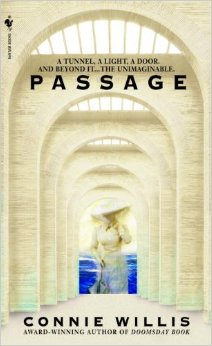This week’s Flashback Friday: Passage by Connie Willis.
 Passage is a book unlike anything else I’ve ever read by Connie Willis. It’s a profound book that I think everyone should read, but one that shouldn’t be read alone.
Passage is a book unlike anything else I’ve ever read by Connie Willis. It’s a profound book that I think everyone should read, but one that shouldn’t be read alone.
The title is apt to the topic, as for many, passage & death are interconnected. The dead pass on and into whatever, whatever being dependent upon your particular belief system.
Part of her inspiration for the book comes from her mother’s death when Connie Willis was twelve. She was “frustrated that relatives and friends tried to comfort [her] with platitudes, which is something I can identify with. Telling someone that their loved one has “moved on to a better place,” is insulting to those grieving as it implies that being here with their loved ones isn’t as good a place or worth sticking around for.
I realize that the religious out there can and do see the afterlife as a better place for a multitude of reasons, but like Connie, that idea has always felt meaningless and empty. Connie Willis wanted to better understand the process of death and mourning, which is what she explores in Passage. The book gets rather scientific in its descriptions of the time between when someone dies and when they are resuscitated, which I enjoyed as much as I did the characters.
Death is a part of life and as an author, it’s a part of my job. There are characters that will need killing to further the plot line. My understanding of grief can only help make those moments more realistic.
 I’ve heard many debate the killing of a character, saying that people read to escape reality and therefore, they don’t want to see realistic events in books such as death, but if a book doesn’t feel “real,” a reader will struggle to identify with the characters. They won’t sink into the world and feel a part of it. Yes, reading is an escape, but it’s also an adventure. Narnia wouldn’t have been nearly as cool if I hadn’t felt like I was running right alongside the characters. Every time I saw a wardrobe, I wondered–if I opened the door, would Narnia be on the other side?
I’ve heard many debate the killing of a character, saying that people read to escape reality and therefore, they don’t want to see realistic events in books such as death, but if a book doesn’t feel “real,” a reader will struggle to identify with the characters. They won’t sink into the world and feel a part of it. Yes, reading is an escape, but it’s also an adventure. Narnia wouldn’t have been nearly as cool if I hadn’t felt like I was running right alongside the characters. Every time I saw a wardrobe, I wondered–if I opened the door, would Narnia be on the other side?
That’s part of the magic of fiction, part of the escape. As much as I cried when Dumbledore died in the Harry Potter books, his loss made me feel connected to the surviving characters that much more. Feeling loss helped me love all the more.
It’s funny–last Locus Writing Workshop, Connie reiterated that you never kill the puppy. She’s always hesitant to kill a character. While I’m hesitant, I do see the necessity. If the puppy’s a character, sometimes the puppy’s gotta die.
I think sometimes authors rely too heavily upon it, like a crutch, and use it to push along an already limping plot line, but when used sparingly, it makes the story come alive. It makes the story real.
If death is a part of life, it should be a part of our fiction as well.

